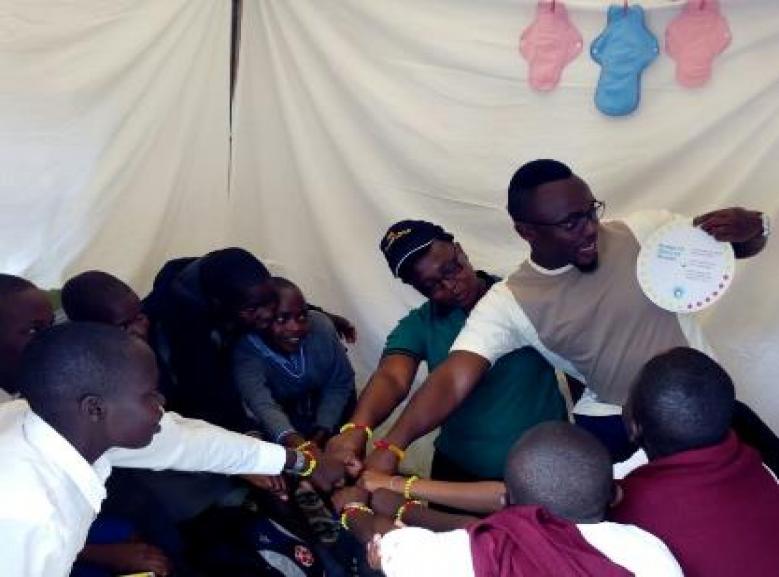Continue with menstrual hygiene management (MHM) activities during COVID-19 as so much still needs to be done especially for the vulnerable.
Published on: 08/04/2020
When the government of Kenya announced the first corona virus case, there was no doubt that the country had joined other economies in fighting the global pandemic. Whether Kenya will take strict decisive measures to mitigate the spread of the highly infectious virus was no longer a matter of „if‟ but „when‟. And on 15th March 2020, the government of Kenya closed all schools and directed that all public and private sector workers work from home, wherever possible.
The news was received with mixed reactions especially from menstruating female learners in remotest parts of rural Kenya. This is potentially a vulnerable group that is often left behind with untimely and inadequate access to menstrual information, management materials including soap, water, private spaces and disposal mechanism. Sub-optimal WASH conditions in schools may hinder girls’ ability to concentrate in class, attend school when menstruating, or at worst drop out of school completely. Additionally, in terms of sanitary product provision, about 30% of the schools sampled provided sanitary pads for their students, but in most instances sanitary pads were only provided for emergencies (Alexander, et al., 2014). Provision of safe water and appropriate sanitation facilities within schools has been proven to enhance girls’ attendance and retention, boost health and education outcomes, promote gender equality and provide inclusiveness. However, in September 2019, Jackline Chepng’eno, a pupil at Kabiangek Primary School, Bomet County Kenya, committed suicide allegedly due to embarrassment and shame after she was vilified by her female teacher for staining her dress with menstrual blood. It was Jackline’s first menstrual experience.

Therefore, what are some of the opportunities and limitations faced by menstruating girls at school compared to experiencing the natural phenomena at home during this time of COVID-19?
Menstruation is a social stressor among teenage girls in Kenya (Mason et al. 2013; McMahon et al. 2011), which affects self-esteem, school attendance, and concentration while in school (Mason et al., 2015). In focus group research, girls reported significant worries, such as leaking of menstrual blood, fear of sexual harassment from teachers and male peers, shame, and confusion surrounding menstruation as barriers to successful management of their periods (McMahon et al., 2011).
On the flip side at home, pubescent girls manage menstruation with locally available cloths which are reusable and can be washed and dried with significant reduction of fear of being embarrassed and ashamed. “Most of the girls live in abject poverty and cannot afford commercially produced reusable pads”, points out a teacher from Nakurio Primary school in Turkana County. “Absenteeism during menstruation is common and we believe that at home, despite period poverty challenges, these girls are likely to manage menstruation with ease.”
Compounded with arid and semi-arid status, water accessibility remains a challenge for effective use of reusable sanitary pads for girls in Turkana Central Sub County. Additionally, reusable pads have not been standardised in Kenya and their absence in retail stores prompts creativity and innovation in keeping up with traditional approaches of managing menses today.
Generating quality data for evidence to better understand how MHM can improve girls’ education outcomes, we need impact evaluation research that reliably measures absenteeism in school as well as learning at home. Few studies have plausibly identified the role of menstrual hygiene interventions in reducing absenteeism. And where absenteeism is inevitable, as is the case with the current COVID-19 pandemic, interventions for increased MHM awareness that interface poverty, gender and education need to move beyond individual social variables and determinants of good health to developing culturally sensitive responses that factor dynamism, diversities and complexities within communities including the ability to cope during emergencies.
Mainstreaming key MHM indicators that monitor adolescent girls‘ absenteeism in WASH programming would have significant implications in achieving the Sustainable Development Goals (SDGs) regarding health, education, economic empowerment and gender equality. A clarion call is therefore made not to allow the current global corona outbreak to erode the vital MHM gains already made in leaving no one behind but leverage these times to learn how to increase intervention effectiveness.
At IRC we have strong opinions and we value honest and frank discussion, so you won't be surprised to hear that not all the opinions on this site represent our official policy.